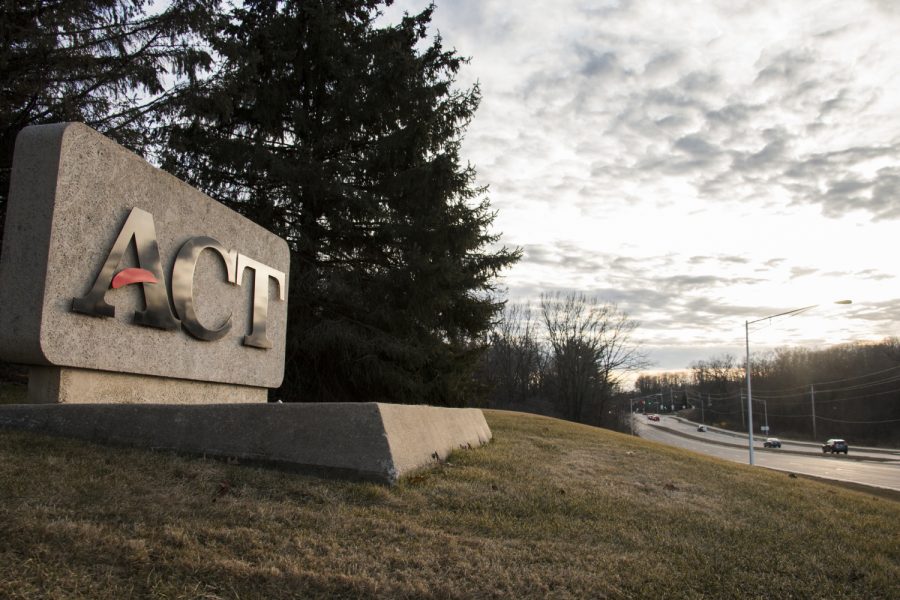Startup designed to reveal Iowa’s ‘hidden advantages’ as an EdTech destination
Iowa universities, government organizations, and tech businesses alike have banded together as members of the Iowa Innovation Council — a group formed with the mission of advancing Iowa as a landmark EdTech state.
The ACT sign is seen outside of the ACT Headquarters on Monday, March 5, 2018. ACT offices are expected to experience upcoming lay-offs.
October 30, 2019
Iowa companies have been trying to become leaders in new forms of education such as artificial intelligence and augmented reality with innovative techniques such as “EdTech,” or Education Technology.
Adam Keune, co-founder of educational software company Higher Learning Technology, said he sees “Iowa nice” as a double-edged sword. While the down-to-earth, helpful nature of Iowans is what helped his company take off years ago, he said it has also been the state’s downfall.
“People from Iowa tend to be very humble, so they aren’t the type to brag about being good at stuff. But at the same time, we need to make people aware that there is a great ecosystem here for startups that are interested in changing education,” Keune said.
To shine a light on Iowa’s hidden advantages, the Iowa Economic Development Authority recently funded a report by research company TEConomy. The report supplied four strategies that could add upwards of 1,000 EdTech sector jobs in Iowa, if implemented.
The first goal emphasizes collaboration and networking. In an effort to fulfill this goal, the Iowa Innovation Council was created, co-chaired by Keune. Members of the council include state universities, the Department of Education, businesses such as the ACT, as well as several younger technology startups.
“[The Iowa Innovation Council] helps us to come together and share assets, share insights, and ultimately work together to advance this particular initiative,” said Tom Banta, director of strategic growth for the Iowa City Area Development Group.
A primary focus of the council is the creation of an EdTech incubator — the Iowa Education Technology Startup Accelerator. Ada Woo, senior director of strategy implementation for ACTNext, said this startup is one way the council hopes to grow the EdTech ecosystem.
“Anyone that has a good idea about EdTech, or a new tech company, is eligible to apply to the startup accelerator,” Woo said.
As the other co-chair of the council, Woo and a group of other leaders in the incubation process will go on to evaluate what technologies are most promising or could use the help of the incubator the most.
“There’s no shortage of technologies out there, but how many of them actually work, and what kind of rigor or process can we put around the evaluation of these kind of technologies?” Banta said.
That’s where the incubator’s job comes in, Banta added.
Depending on their implementation, new education technologies developed through the incubator hold the potential to create personalized education experiences, Woo said.
“In classroom learning, often times you see one teacher teaching a class full of kids, and [they] will only be able to tailor [their] content for the kids in the middle,” Woo said. “Kids who are doing really well or lagging behind may not get the personalized attention that they need.”
But the startup is still in its early stages, Woo said, and new technologies aren’t quite ready for the classroom. The council is currently reviewing applications to create a cohort of the most promising applicants by early 2020.
There is no “one size fits all” when it comes to education, Keune said, adding that the future of individualized education begins with the diversity of perspectives involved in developing it. The Iowa Innovation Council is invaluable for this very reason, he said.
“Education is always a priority for the state of Iowa,” Keune said. “Once we get this initiative off the ground and rolling, we’re going to keep the tradition going of creating great places for students to learn.”



